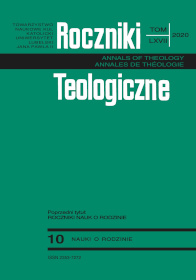Development of the Agency of Ukrainian Children – Forced Migrants: Tasks of School and Family
Abstract
The article reveals potential influence of educational environment and conditions of family education on manifestation of pupils’ own agency in the context of contemporary Ukrainian realities, in particular, forced migration. Agency support is recognized as an important task of ensuring a vital stability of individuals and updating their personal resources, which are aimed not only at adapting to empirical, social, cultural and existential reality in which they live now, but also at their self-development. To achieve this aim the peculiarities of organization of educational environment and system of family education in changed conditions of life realization have been designed.
Importance of providing psychological and pedagogical support for development of the agency of schoolchildren is substantiated. That can be reached by encouraging teachers to use a humanitarian approach in education and creation of children picture the world, where value-meaningful attitude to multicultural space contributes to personal growth, and to development of individual educational trajectory for them, which makes possible realization of personal potential and needs by pupils in self-development. Parental influence is presented as an important factor for children to gain new experience of self-awareness through indirect approach in education, transfer of positive experience in overcoming difficult life situations, creating a situation of success in socialization of a child. Particular emphasis is made on cooperation of family and educational institution in identification of markers of agency, their manifestation in patterns of behaviour and values of children. The need to formulate a whole value adult attitude to a child’s desire to be an agent of change and self-change is emphasized.
References
Asmolov, A. Ot pedagogiki dressury, znanij, umenij i navykov – k pedagogike variativnogo razvivayushego smyslovogo obrazovaniya, http://asmolovpsy.ru/ru/motives/113 (22.01.2020).
Diialnisna samorealizatsiia osobystosti v osvitnomu prostori. Ed. S. Maksymenko. Kyiv: Vydavnychyi Dim „Slovo”, 2017.
Halian, O. „Pryntsyp subiektnosti osobystosti shkoliara u navchalno-vykhovnomu protsesi: teoretychne obgruntuvannia potreby zaprovadzhennia.” Visnyk Chernihivskoho natsionalnoho pedahohichnoho universytetu imeni T.H. Shevchenka, Seriia: Pedahohichni nauky (2017), 144: 343-347.
Halian, O., Gera Т. „Markery subiektnosti osobystosti v diahnostytsi subiektyvnoi yakosti zhyttia y osobystisnoi samorealizatsii vymushenykh pereselentsiv.” Naukovyi visnyk Khersonskoho derzhavnoho universytetu. Seriia Psykholohichni nauky (2017), 2, 1: 69-73.
Halian, O., Halian, I. “Specyfika pomocy psychologicznej dla rodzicow w realizacji skutecznych strategii wychowania rodzinnego.” Pedagogika rodziny. Family Pedagogy (2013), 3(4): 203-213.
Ilin, V. “Gumanitarnoe znanie v kontekste sovremennoj kultury.” Nasha vlast: dela i lica (2012), 5-6(120), http://nashavlast.ru/article_description/135/2120.html (20.01.2020).
Klochko, V. Samoorganizaciya v psihologicheskih sistemah: problemy stanovleniya mentalnogo prostranstva lichnosti. Tomsk: Tomskij gosudarstvennyj universitet, 2005.
Ksenofontova, А. “Tehnologiya razvitiya subektnoj pozicii uchashegosya.” Vestnik Chelyabinskogo gosudarstvennogo pedagogicheskogo universiteta (2016), 7: 77-81.
Martin, K. Learner-Centered Innovation: Spark Curiosity, Ignite Passion and Unleash Genius. London: IMPress, LP, 2018.
Olszewski, K., Talik, E., Oleś, M. “Martwienie się młodzieży w okresie dorastania a percepcja postaw rodzicielskich.” Psychologia rozwojowa (2016), 21, 3: 89-103. DOI:10.4467/2084 3879pr.16.018.5529.
Rogers, C.R. Freedom to Learn for the 80s. Columbus, OH: Charles E. Merrill Publishing Company, 1983.
Rubinshtejn, S. Bytie i soznanie. Chelovek i mir. Sankt-Peterburg: Piter, 2003.
Samoproektuvannia osobystosti u dyskursyvnomu prostori. Ed. N. Chepelieva. Kyiv: Pedahohichna dumka, 2016.
Serkowska-Mąka, J. “Szkoła dla Innego. Filozofia i pedagogika dialogu w edukacji międzykulturowej.” Studia Paedagogica Ignatiana (2019), 22, 1: 52-72. DOI:10.12775/SPI.2019.1.003.
Skotna, N. Osoba v rozkolotii tsyvilizatsii: osvita, svitohliad, dii. Lviv: Ukrainski tekhnolohii, 2005.
Tomaszek, K. “Wielowymiarowość zaangażowania uczniów w aktywności szkolne.” Psychologia rozwojowa (2017), 22, 1: 29-45. DOI:10.4467/20843879PR.17.002.6416.
Wołpiuk-Ochocińska, A., Marmola, M. “Percepcja technik wychowawczych rodziców a zadowolenie z życia młodych osób w okresie adolescencji i wczesnej dorosłości.” Psychologia rozwojowa (2018), 23, 3: 39-54. DOI:10.4467/20843879pr.18.015.9356.
Copyright (c) 2020 Roczniki Teologiczne

This work is licensed under a Creative Commons Attribution-NonCommercial-NoDerivatives 4.0 International License.





